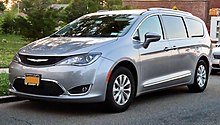
Minivan (sometimes called simply a van) is a car classification for vehicles designed to transport passengers in the rear seating row(s), with reconfigurable seats in two or three rows [citation needed]. The equivalent classification in Europe is MPV (multi-purpose vehicle) or M-segment - and are taller than a sedan car, hatchback, SUV or station wagon.[2][3][4][5]
Compared with a full-size van, most minivans are based on a passenger car platform and have a lower body. Early models such as the Ford Aerostar and Chevrolet Astro utilized a compact pickup truck platform.[6][7] Minivans often have a 'one-box' or 'two-box' body configuration, a higher roof, a flat floor, sliding doors for rear passengers, and high H-point seating. The largest size of minivans is also referred to as 'Large MPV' and became popular following the introduction of the 1984 Dodge Caravan and Renault Espace. Typically, these have platforms derived from D-segment passenger cars or compact pickups. Since the 1990s, the smaller compact MPV and mini MPV sizes of minivans have also become popular.[8]
Though predecessors to the minivan date back to the 1930s, the contemporary minivan body style was developed concurrently by several companies in the early 1980s, most notably by Chrysler (producer of the Chrysler minivans) and Renault (the Renault Espace), both first sold for model year 1984. Minivans cut into and eventually overshadowed the traditional market of the station wagon and grew in global popularity and diversity throughout the 1990s. Since the 2000s, their reception has varied in different parts of the world: in North America, for example, they have been largely eclipsed by crossovers and SUVs, while in Asia they are commonly marketed as luxury vehicles.
- ^ "Ranked: 5 best-selling new minivans in the U.S. in 2020". AutomotiveMap. 10 August 2020. Retrieved 17 January 2021.
No. 1 - Chrysler Pacifica (93,802 sold)
- ^ "minivan". Cambridge Advanced Learner's Dictionary & Thesaurus. Cambridge University Press. Retrieved 30 May 2017.
- ^ "Regulation (EEC) No 4064/89 - Merger Procedure" (PDF). ec.europa.eu. Luxemburg: Office for Official Publications of the European Communities. 17 March 1999. p. 2. Retrieved 3 March 2019.
- ^ "Car prices within the European Union / Prix des voitures au sein de l'Union européenne / Autopreise in der europäischen Union" (PDF). ec.europa.eu (in English, French, and German). Brussels: Publications Office of the European Union. 1 January 2011. Retrieved 3 March 2019.
- ^ "Impact on the Competitiveness of the European Automotive Industry of Potential FTA with India and ASEAN" (PDF). europa.eu. p. 8. Archived from the original (PDF) on 29 April 2013.
- ^ Taylor, Rich (February 1990). "The Light Vantastics". Popular Mechanics. Vol. 167, no. 2. p. 64. Retrieved 17 September 2020.
- ^ "Mass Transit". Popular Mechanics. Vol. 164, no. 11. November 1987. p. 72. Retrieved 17 September 2020.
- ^ "Our pick: Top 10 used mini-MPVs". Auto Trader. 3 August 2010. Archived from the original on 5 March 2012. Retrieved 28 February 2012.